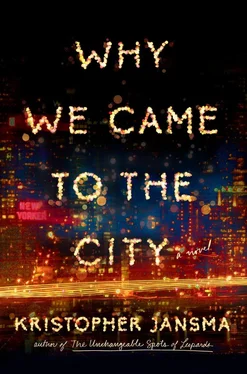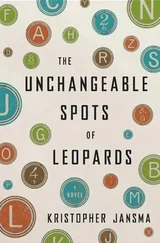“I wish you could sleep down here with me tonight,” Irene said, pouting. But William could feel it — she was lying. There was this imposter look about her; it was hard for him to put his finger on. It was the way she’d sounded when she’d first called. Like Joan Fontaine in the movie.
“We’ll have to leave tomorrow for the hospital before the girls are even up to open presents. But I have something for you,” William said, taking a rectangular pile of silk out from the pile of extra clothes that his mother had given him for Irene. “Merry Christmas.”
“Oh, William,” she moaned, touching it. She unfolded the parcel, and it became a beautiful silk kimono, covered in butterflies and weeping trees and winding rivers. “It’s—”
“It’s a little old,” he apologized. “But I promise it’s never been worn.”
Irene began to cry a little, and William couldn’t think why. He moved in to comfort her, but she pulled away, as if she were contagious and might infect him.
“I feel awful,” she said. “I bought you something but I left it at my apartment.”
Irene slipped the loose kimono on over the billowing pajamas that Mrs. Cho had given her. William was stunned at how beautiful she looked in its folds. There were tears in her eyes.
“I’m sorry,” she said, kissing him on the forehead tentatively, as if she weren’t sure it wouldn’t leave a mark.
“What for?” William asked. And though she had lied to him over and over, and though she had refused, again and again, to tell him the truths he wanted her to tell, he said, “You’ve done absolutely nothing wrong.”
“Give me time,” she said lightly, as if it could be a joke.
He left her there and went up to his old bedroom to sleep. In the morning, she was gone. The only sign of her was a little water on the floor by the front door where the snow had blown in on her way out and then melted.
William took the subway back down to her apartment, but the main entrance was locked and no one answered. He followed someone through the front door, went upstairs, and pressed his ear up against her door. It was ice cold, and there wasn’t a single sound inside. He called the hospital, hoping, but the nurses there said she hadn’t shown up yet for her appointment. Dr. Zarrani called back, worried, and told William that if Irene didn’t come in for the second half of her dose, they’d have to start all over again. She asked him if he might know where she would go. Was there anyone else she might be staying with? William said he didn’t know, that he didn’t really know that much about her. He didn’t know where she was from. Would she go to Sara’s, up north? Then he thought about the photograph and its inscription. He hopped in a cab and asked the driver to take him to Penn Station.
The train station was empty on Christmas morning. Silence hung in the open terminal like a kind of fog. Most of the shops and restaurants were closed, their grates rolled down and locked tight, garlands hanging heavy above the archways, as if they knew that by the next morning they would be taken down and thrown away. William found Irene sitting on a bench, still wearing the stained red dress. She sat by the big clapboard train schedule, reading William’s copy of the Iliad .
She looked up at him when she saw him coming. “Can’t you leave me alone?”
“Dr. Zarrani said you have to come in before noon today or they’ll need to start over.”
Irene shook her head and clapped the heavy book shut. “I’ll call her.”
“To tell her what exactly?”
“That I’m going away for at least a month, maybe more. I’m sorry, William, we both know it wasn’t going to work out with us. I can’t explain. I’m just like this. I’m—”
William looked down at his phone and read off the words he’d translated the day before.
“Tu es toujours sur le point de me quitter.”
Irene frowned as William sat down on the bench next to her. He knew he had badly mispronounced the line. “I went by your apartment to get you a dress the other day. There weren’t any bugs. And I saw the gift you got me…”
“It’s a scarf,” she said softly.
“And I saw the dirty pictures in your birdcage. I saw what that girl wrote to you.”
Irene didn’t seem upset or violated. She just looked tired. “See? It’s not just you, William.”
“I actually wouldn’t have thought that it was.”
She looked up at him. “Oh, no?”
“No,” William said, and then kissed her forehead once before patting the book as if to say goodbye to it. “I didn’t think I mattered that much to you, No Ears.”
He hadn’t really meant it to be cruel, only true. There was nothing about her that belonged to him. Everything he knew about her, he’d stolen.
• • •
Irene watched William walk away, and then for several more minutes she watched train after train departing. There was one heading for San Francisco, but she didn’t want to go there, not really. She didn’t want to go to Boston, St. Louis, Raleigh, or Chicago either. She’d been to all those places before, and there were other Williams in each of them. Irene kept reading about Ajax and Hector and Priam. Warriors lacing their armor on for battle in one refrain, only to lie slain and forgotten in the sands of the next. All for some “beautiful” woman whom none of them really cared about at all. Irene flipped backward and forward. The men all died and died again. Trains arrived; trains departed.
Irene flipped to the page where William had written his note. Was there some God or gods who knew her fate? She stared up at the wide empty space above the clapboard. Bakersfield. Albuquerque. Pittsburgh. Burlington. Two dozen tracks to the end. Twenty-four places to die. Man must have free will, William had written, or else why would the gods themselves bother?
She sat up straight and closed the book. She rested her hand on her hip. There was still a faint fishy taste on the back of her tongue. She stood up and walked past the tracks to the tunnel for the subway. She rode to the hospital. She apologized to Dr. Zarrani and said there had been an accident on the 5 train and she’d been stuck, underground, for an hour. The doctor said she’d make some adjustments, but they hadn’t lost too much time. Before the nurses hooked her up to the IV, Irene changed into the kimono. Its loose arms fell gently over the elbow where the tube went in, and she felt a great freedom as she drew and drew, nothing but fish eyes. Cold, with dead black pupils staring out at her.
When the dose was over, Irene took the subway home, and was so flushed she had to pull her coat open with only the kimono underneath. People stared, but she didn’t care. It was New York, and there were stranger people than her in every neighboring car. The thought comforted her.
She had already arrived in the place she belonged. Once she was safely inside her apartment, she turned on the heater. There was a loose thread at the sleeve of the kimono that had been tickling her all day long. She tugged, and more silk came away in her hand without breaking. She pulled and pulled at the thread for minutes, until there was no cuff, and then only half a sleeve, and then no sleeve at all. She let the thread fall around her feet.
William called. She didn’t answer. Sara called. She didn’t answer. In a week Sara would be back in the city and she would have to tell her everything, but not yet. She kept pulling until the collar and the bodice and the hem and the other sleeve were all entirely unraveled. Soon the silk thread was piling up to her naked waist. She unraveled the rivers and trees and the carp that swam in circles. At last she unraveled the final stitch. She felt safe and warm as she burrowed into the nest of silk. She had eaten almost nothing since the fish eyes, but she wasn’t hungry. She closed her eyes as she pulled the silk in around her. She wanted nothing more than to rest there in that enormous cocoon, for days and weeks, and then emerge — free of poisons and tumors and heartsickness. With wings , she thought to herself, as sleep finally came.
Читать дальше












